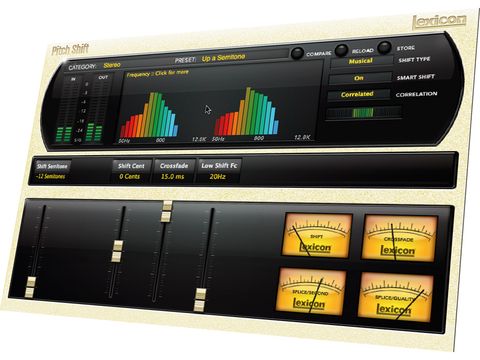Lexicon's name is synonymous with high-quality effects processing, and last year its Native Reverb bundle allowed DAW-owners access to its classic spatial treatment programs.
However, the classic Lexicon hardware units contain more than just reverb algorithms so a separate suite is now here to provide seven prized Lexicon effects. Entitled the 'Native Effects Bundle' it runs in 32-bit and is copy-protected via an iLok 2 licence.
"The sonic results are impeccable and will enhance the mix standard of productions in any musical style."
Chorus and dual delay
With any of the plug-ins, the best place to start is to choose a 'Category' and then browse the related presets. All of the plug-ins echo the design of the Reverb bundle with a 'front page', which includes faders in the bottom section and the option to switch on tailored real-time displays at the top to see graphical read-outs of the effects in action.
The default 'soft' sliders at the bottom allow you to adjust any preset, while the Edit button at the top of each interface allows you to delve much deeper, with tabs along the bottom of the plug-in to select each page's parameters.
This is where the effects come alive, as they can be customised in myriad ways. Working through the effects alphabetically, Chorus brings classic 'doubling' processing to your mixes, via plug-in categories of Flangers, Chorus, Vibrato FX and Odd Rooms.
At the heart of Chorus lie four independent LFOs that each offer nine waveshapes, including the input audio itself. The signal is then split into a whopping four voices on each of the left and right channels and you can decide which LFO will affect each voice.
These voices are effectively delay channels, so there are time controls that offer constantly sweeping read-outs of the delay time as it shifts in sync with its LFO.
Each voice also features its own filter, with four low-pass options alongside band-pass and notch filters - such tone-shaping options are common to almost all effects in the suite.
The Dual Delay plug-in is based on similar architecture but lacks the modulation and LFO features of Chorus. 'Dual' actually refers to the fact that there are two separate delays per channel, with the option to set free or sync'd delay times for both on the left and right.
The filtering options are present again and this is an effective plug-in for instruments and vocal parts alike - with tone-shaping of each delay tap a wonderful way to thicken lead vocal parts in particular.
The options available to alter Delay Diffusion also add great levels of sonic character to the results, whilst the Tape Delay presets add a more vintage character to proceedings.
Queering the pitch
The MultiVoice Pitch plug-in offers multi-channel pitch-shifting from the input source with three voices on each side of the stereo mix. Each of these voices can be allocated a transposition amount ranging from minus to plus 12 semitones, with free-time or sync'd pre-delay before each pitch tap occurs.
Each one can also echo in its own right, so it's possible to create 'staircase' effects where input signals tumble up or down pitch ladders, or to create chords around an input signal to turn monophonic lines into thicker results.
The presets create a great launch-pad for your experiments and we'd expect this plug to be of immense value to sound designers as some truly unique results can be achieved.
If more straight-forward pitch-shifting is your bag, turn to PitchShift. This also offers +/- an octave of transposition plus pitch-shifting in cents, so you can achieve anything from gentle detune to radical change.
The algorithm is incredibly warm and rich and even at extreme settings produces musical results. These results can be enhanced via the 'Crossfade' and 'Low Shift FC' sliders too.
In order to work effectively, PitchShift breaks the input signal into tiny 'splices' and Crossfade controls the smoothness of these.
Equally, it's helpful to target the lowest frequency at which PitchShift will 'look' for the best splices. Shifting the slider to target the frequencies most active in your signal improves the results.
Random and resonance
Random Delay unites the LFO capabilities of Chorus with the Dual Delay's multi-tap echoes. However, rather than wobbling pitch around the delays, four independent LFOs can be set up here to modify the times of the four delays (two left, two right). You can assign the same LFO to every delay tap or each can be given its own.
Each LFO is a random output signal based on nine wave-shapes and can be set between rates of 0.01Hz and 10Hz. The parameters here mean you can either create weird warped delays, set up regenerating loops or accurately model vintage tape delays.
The Resonance Chords plug-in allows each of eight voices to create a 'resonant frequency' which is offered as a delay to an input source. The pitches of these delays can be freely assigned to each voice from C0 to B7 and each features its own delay time, resonance amount and level.
So, you can use a single note to trigger eight pitch-shifted, resonant chords across the stereo field.
Capable of producing scale runs, weird strum-like tremolos and much more besides, it's a truly bewitching effect. The suite is wonderful, balancing immediacy with truly tweakable results for those who want to dive deep into the parameters offered.
The sonic results are impeccable and will enhance the mix standard of productions in any musical style you care to imagine. Another huge Lexicon hit.


